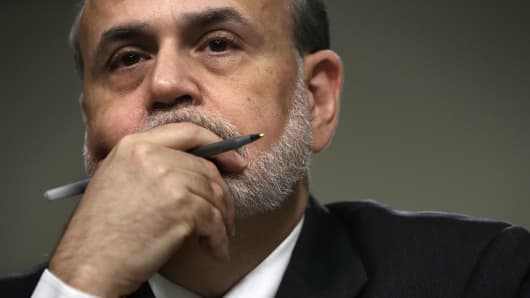(Read More: Economy Caught in Depression, Not Recession: Rosenberg)
"The building blocks for the consumer to grab the torch are being put together with each and every passing data point of late," he said. "Don't fight it. Embrace it."
He viewed last week's jobs report, in which the Labor Department reported 195,000 new positions, many of which were in the services industry, as positive. He cited growth in construction, financial services and health care among others showing employment prospects are improving.
(Read More: Job Growth Posts Large Gain in June; Rate Holds)
From an investment standpoint, Rosenberg believes a bearish case is building for bonds that also reverses a long-held position of his that the fixed income market was the place to be as the economy remained stuck in the financial crisis mire.
A former Merrill Lynch economist, Rosenberg has a wide following, particularly through his daily newsletter.
And he's not alone. Criticism of the Fed for continuing to treat the economy as if it's in crisis is spreading.
Jim Paulsen, chief market strategist at Wells Capital Management, also has been a vocal opponent of continued extreme monetary policy, as he believes the Fed ought to begin decelerating its easing measures. (See related video.)
But the position remains at odds with the Fed's economic view.
The central bank continues unabated with its crisis-level monetary policies that include a targeted funds rate near zero and $85 billion of monthly purchases of Treasurys and mortgage-backed securities.
Chairman Ben Bernanke rattled markets recently when he suggested the bond-buying leg of Fed policy could wrap up by 2014.
But after markets reacted violently—a sharp stock selloff of more than 7 percent on an intraday basis and a rise in Treasury yields exceeding 1 percent—Fed officials have been in damage control to assure the market that any action would be data-dependent and done gradually.
In fact, in remarks Wednesday, Bernanke contended that the unemployment rate of 7.6 percent remained far too weak for the Fed to consider tightening. Those comments came after Fed June meeting minutes suggested divisions in the Open Markets Committee over policy direction.
(Read More: Fed Officials Worried About Easing)
"The Fed has taken a step backwards in terms of communication," said Michael S. Hanson, senior U.S. economist at Bank of America Merrill Lynch. "By offering so much information in such a muddled fashion, they have made policy less transparent."
It is the Fed's continued fear of another economic relapse, and the potential for ensuing policy mistakes, that concerns Rosenberg.
He compared the third round of quantitative easing to the first two, and said circumstances this time are far different.
"In contrast to the threats in 2010 and again in 2011 to withdraw from QE, there is no talk today of a 'double dip' recession—there was back then and that is why the stock market took it on the chin," he said.
"In 2010 the economy was still shedding jobs and the unemployment rate was around 10 percent, and in 2011 it was not evident that the housing market had gained traction—and yet today we have home prices rising at a pace we last saw in the 2006 real estate boom year," Rosenberg added.
(Read More: Is This the Most Hated Bull Market Ever?)





